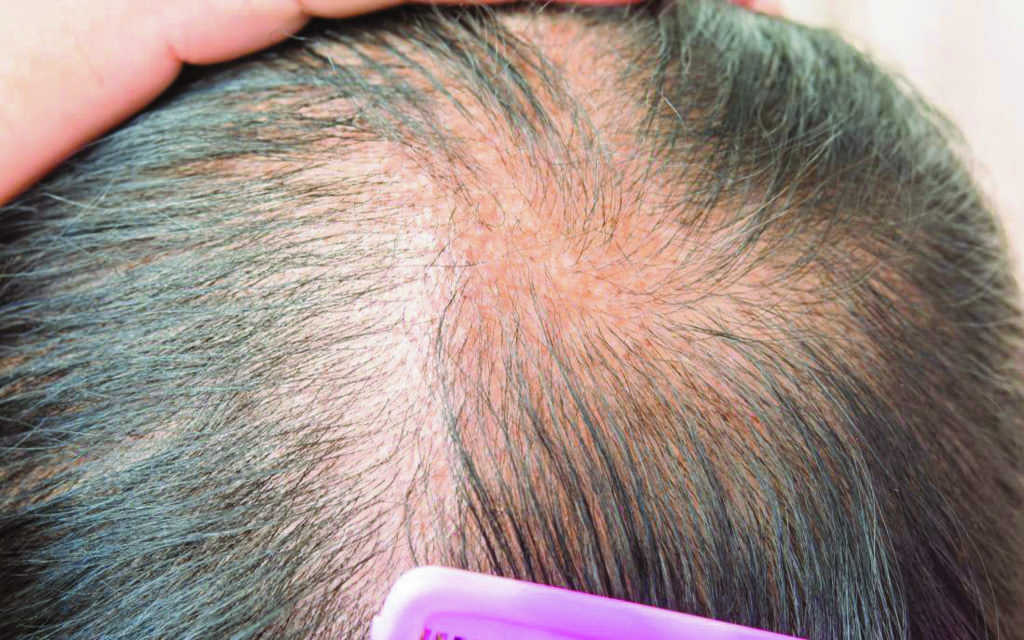In human beings, active phase of hair growth lasts 3-5 years, followed by a 10-day transitional period, and finally the hair sheds and follicles fall out. The follicle is then inactive for three months before the whole cycle is repeated. Some experiences rapid and sudden period of loss, which is caused by some sort of internal disruption, including nutritional inadequacies, illness, surgery or hypo/hyperthyroid..
The American Academy of Dermatology defines normal hair loss as 50 to 100 strands a day, so anything more than your usual amount could be reason to see a doctor. Doctors say hair loss due to hormones, stress, iron and diet-related causes is generally reversible. It’s harder to reverse hair loss connected with hereditary causes or rare inflammatory cases.
Hormones
Hormones can wreak havoc on our skin, and unfortunately that applies to our hair, too. A balance of estrogen, progesterone and testosterone is necessary for healthy hair growth.
Although estrogen usually promotes hair growth, when in excess, it can tip the balance and actually increase testosterone, causing a testosterone-related hair loss.. In that case, there may be a genetic predisposition to dihydrotestosterone (DHT), which attacks the hair follicle, diminishing and eventually resulting in total loss of the follicle.
To stop hormones conversion, the one most prescribed drug is Finasteride. Although only approved for men, women have also had success with it. This is a prescription-only drug, so speak to your doctor if you think it might be a good fit and ensure you know all the contra-indications, which include loss of libido among others.
Pregnancy Hormones
Hair fall during pregnancy is not uncommon. Though not every woman experience this, for those who do it’s due to a prolonged anagen phase thanks to higher estrogen and progesterone hormones during pregnancy. Reports say 40% of women will experience excessive shedding (telogen effluvium) post-birth. This is due to the physical stress of the labor, and it’s self-resolving without treatment. Its effects are temporary, lasting around three to four months, and starting at three months post-birth. Being diligent with the intake of all necessary vitamins and minerals is helpful in dealing with this type of hair loss, and it’s completely reversible.
Menopause Hormones
Both before and during menopause, hormonal changes affect hair growth, particularly due to a decrease in estrogen and progesterone. The decrease in the female hormones leave the hair cells unprotected from circulating androgens. Over time, the hair shafts will thin, miniaturize and eventually die. “Estrogens are ‘hair friendly’ and help to keep strands in the hair growth phase. They also offer a sort of buffer against androgens, which are not very good for your scalp hair. The extent to which a woman will experience changes to hair diameter is down to genes.
Studies have shown that Finasteride can be successful against hair loss in pre- and post-menopausal women who do not intend to be pregnant. There are suggestions that anti-androgen hormones can help, as well as iron supplements. Hormone Replacement Therapy (HRT) can be beneficial in hair loss too, by slowing it down or stopping it completely, studies show. Another topical treatment that is proven to work in menopausal women is Minoxidil.
Thyroid Irregularities
The thyroid gland is responsible for regulating our metabolism, and it’s usually the first thing a doctor will look at if you have issues with weight changes or hair loss. Thyroid hormones are released in the body at a steady steam, regulating everything from breathing to temperature, body weight and hair growth. Nutrition and thyroid disease can affect the release of those hormones, and low thyroid hormones, also known as hypothyroidism, can cause reversible alopecia and even lateral eyebrow thinning. With proper medication to support the thyroid, the hair loss can be completely reversed.
Anemia
Anemia, or iron deficiency, is one of the most common causes of hair loss in women, apart from hormones. Low iron stores can force hair into a chronic rest phase, resulting in increased shedding and reduced density, which leads to iron deficiency in case of sudden weight loss, and is often the result of going on a vegan diet. Iron is used both for hair production and red blood cell production. The body wisely prioritizes the red blood cell production, so if it has a limited amount of iron intake, the first thing to be affected is the hair.
Eating Disorders
These affect the body in various ways, creating physical stress for the body and often resulting in hair loss. The protein in hair (keratin) is not essential for the body, and at periods of malnourishment, hair growth will stop. The body prioritizes nutrients going to vital organs (brain, heart, lungs) over hair, so shedding occurs. Depending on a person’s age, genetic makeup and health status, regular hair growth usually returns in about six months after the malnourished state is resolved.
Heredity
The hereditary form of alopecia is female pattern hair loss, or androgenetic alopecia. This is usually seen as diffused thinning, not bald spots. This form of hair loss can happen at any point during adult life, and is more common in connection to menopause as it’s connected with androgen levels. women with conditions like polycystic ovary syndrome, which is connected with androgen levels, could see hair thinning earlier.



